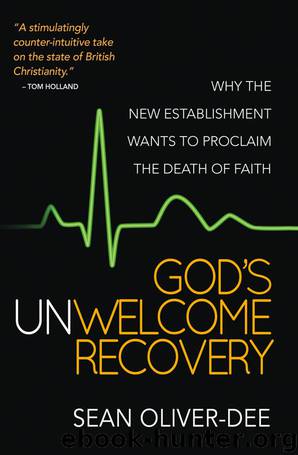God's Unwelcome Recovery: Why the new establishment wants to proclaim the death of faith by Sean Oliver-Dee

Author:Sean Oliver-Dee [Oliver-Dee, Sean]
Language: eng
Format: epub
Publisher: Monarch Books
Published: 2015-08-20T23:00:00+00:00
CHAPTER 6
Religion and Violence
This chapter will take on another aspect of the narrative embedded among some in the “new establishment” – that religion has been the principal cause of strife throughout history, and so in encouraging “the death of religion” they are actually helping humanity. Clearly Islamic terrorism is a current spotlight for this narrative, but frequent referencing of the medieval Crusades and the Reformation wars that so damaged Europe in the sixteenth and seventeenth centuries have become well-worn hooks on which to hang this argument.
Indeed, it is not just the manifestation of violence in the name of religion that’s the issue; religion is also seen as a societal divider which stands in the way of achieving the properly unified societies everyone wants.
I will argue instead that these “evidences” are actually examples of the struggle for power and control which are a natural part of human nature; and that, rather than pointing at religion, we could put man-made philosophies such as communism also as a prime motivator for conquest and power. So rather than cherry-picking some useful historical events, if we want to have an informed debate about Christianity as a cause of violence, we need to argue about the principles enshrined in the philosophy or faiths themselves.
Old struggle, new century
In his book about the rise of the so-called “new atheists” Alister McGrath observes that 9/11 was a seminal moment for those, like Richard Dawkins, who had been arguing for years that religion was a dangerous influence in the world.1 In the wake of the attacks, as McGrath shows, the phrase “Islamic terrorism” was adjusted to “religious terrorism” and then simply “religion”. Dawkins more than inferred that violence was the natural outworking of religion in his article shortly after 9/11:
To fill a world with religion or religions of the Abrahamic kind, is like littering the streets with loaded guns. Do not be surprised if they are used.2
Years later Polly Toynbee expressed the same sentiment in her Guardian column: “Wherever the institutions of religion wield real power, they prove a force for cruelty and hypocrisy.”3
This same argument is made in Chapter 2 of the international bestseller by Christopher Hitchens, God Is Not Great (2007) with great self-righteous abandon. The chapter opens with a quote from the Roman Lucretius, “To such heights of evil are men driven by religion”, which is presumably there to show that there have always been those that have felt this way. Lucretius lived at a time when there certainly were some incredibly cruel things done in the name of religion: we only have to think of the practice of child sacrifice to Moloch in the ancient Near East (as recorded in the Bible), or the pagan human sacrifices practised by the druids in the vast forests of northern Europe, or the oceans of human blood spilt on the Aztec altars of South America. But it should be remembered that there are few cultures that have had as strong a blood-lust as Lucretius’ own Roman one, where it was purported in the name of “entertainment”, rather than religion.
Download
This site does not store any files on its server. We only index and link to content provided by other sites. Please contact the content providers to delete copyright contents if any and email us, we'll remove relevant links or contents immediately.
| Buddhism | Christianity |
| Ethnic & Tribal | General |
| Hinduism | Islam |
| Judaism | New Age, Mythology & Occult |
| Religion, Politics & State |
Cecilia; Or, Memoirs of an Heiress — Volume 1 by Fanny Burney(31333)
Cecilia; Or, Memoirs of an Heiress — Volume 3 by Fanny Burney(30934)
Cecilia; Or, Memoirs of an Heiress — Volume 2 by Fanny Burney(30889)
The Secret History by Donna Tartt(16627)
Sapiens: A Brief History of Humankind by Yuval Noah Harari(13054)
Leonardo da Vinci by Walter Isaacson(11903)
The Radium Girls by Kate Moore(10907)
Sapiens by Yuval Noah Harari(4537)
The Wind in My Hair by Masih Alinejad(4424)
How Democracies Die by Steven Levitsky & Daniel Ziblatt(4399)
Homo Deus: A Brief History of Tomorrow by Yuval Noah Harari(4280)
Endurance: Shackleton's Incredible Voyage by Alfred Lansing(3845)
The Silk Roads by Peter Frankopan(3762)
Man's Search for Meaning by Viktor Frankl(3634)
Millionaire: The Philanderer, Gambler, and Duelist Who Invented Modern Finance by Janet Gleeson(3569)
The Rape of Nanking by Iris Chang(3516)
Hitler in Los Angeles by Steven J. Ross(3437)
The Motorcycle Diaries by Ernesto Che Guevara(3333)
Joan of Arc by Mary Gordon(3259)
